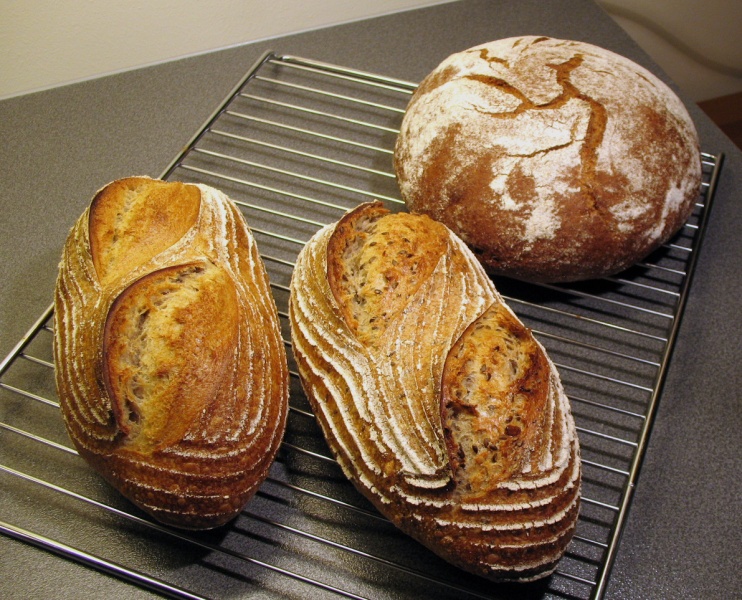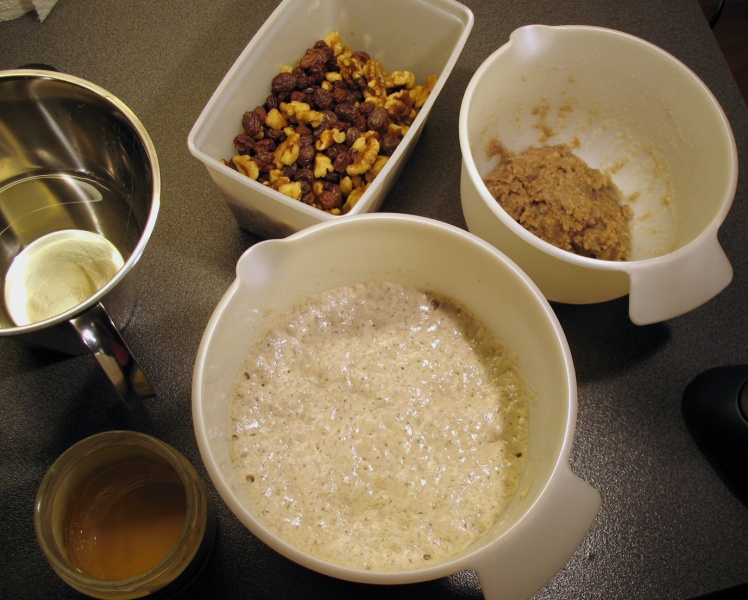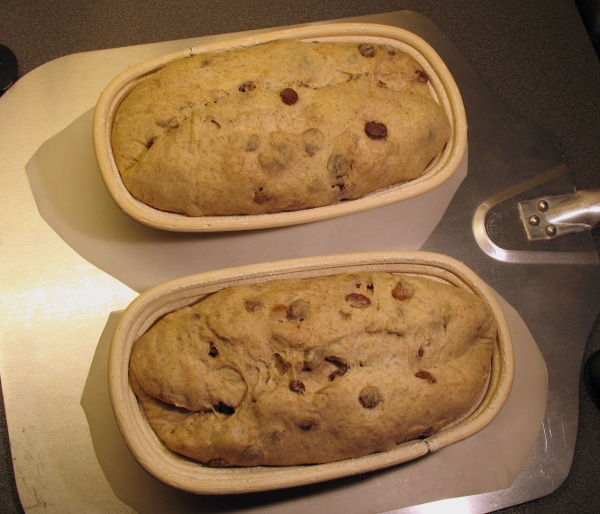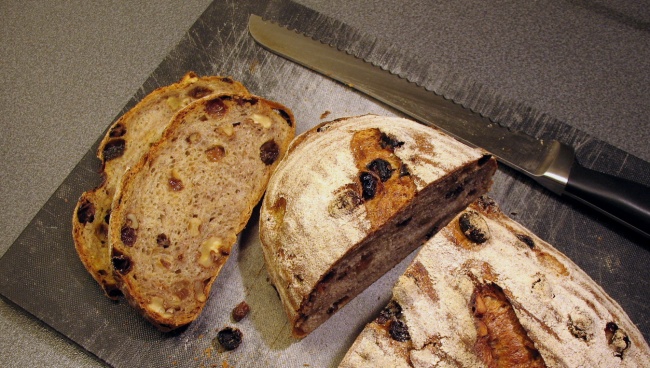
Busy bakes
The last few weeks have been really busy, as I've been preparing my thesis defense, and as a result, my once spoiled starter has faced long, dreary days in the unforgiving cold of the fridge. After three weeks of neglect, it didn't look too perky to tell you the truth. After completing the hardship, I pulled it out four days ago, and started nursing it with nice, cosy, warm water, fresh AP flour and liberal sprinklings of rye flour. It bounced back and took to its old self within a day, so either its short-term memory is pretty bad, or I'm overtly concerned about its state of health... ;)
Anyway, here are the three first breads I baked with it after pulling it from semi-retirement. There's a sourdough rye with walnuts and hazelnuts in the back, and Hamelman's whole-wheat pain au levain and 5-grain levain in front. I promised to bring these along to my parents later today, so I apologise for the lack of crumb shots!

Here's another formula that's kept me going: It's partly inspired by a recipe in Jan Hedh's latest bread book, but I've changed it a bit to make it somewhat lighter. This is a raisin & walnut bread, that's made with a poolish with some rye in it, and with some scalded whole wheat and whole rye flours. Below is the mise en place; scalded flour to the upper right, and the lovely fragrant poolish on the bottom. Much as I love the smell of sourdoughs fermenting, I'm still inclined to say that a poolish smells even better...

Here are the fully proofed, shaped loaves,

and the crumb. Just my kind of bread.

And, finally, here's the formula if anyone's interested (just a snapshot from my spreadsheet). Scald flour and allow the poolish to ripen approx. 16 hrs. 2 hrs. bulk fermentation, with fold after 1 hr. Final proof just shy of 1 hr.


Comments
what size are your oblong pannetons ?
And thanks :)
Those are for approx. 750 gr. dough each, and measure about 26 cm x 12 cm.
thank you.
A piece of Art hansjoakim! you inspire me..
Mebake
Beautiful breads hansjoakim,
There are some interesting twists to your recipe that caught my eye. The addition of a little rye in both the scalding and poolish make me want to try this.
Can you clarify what your scalding process is? By your comments I surmise you are boiling the water and dumping the ingredients in and whisking briefly before cooling.
After making a few batches of the Dan Lepard Black Pepper Rye bread which also uses a scalding process, I have come to use a slightly lower temperature of around 90C water and whisking until I get a slightly thickened consistency. I find it's much easier to control the process at a less than boiling heat. To much thickening or heat requires much additional water at the final dough mixing.
I'm a noob at this scalding method and would like to know your thooughts on it. Thanks.
Eric
I love raisin & walnut bread....I will have to get some fresh yeast from my local pizza shop and try it...do you think it would work with a stiff or wet levain...?
Hope your prep for your defense is on track....
Judd
The artistic scoring of your loaves never fails to impress me! Well done. Good luck on your thesis defense. Hope it's not on bread shoes? Just kidding Hans...
Those are beautiful.
Your loaves are delicious and perfect looking, Hans!
Sylvia
Good luck with your thesis defense!
David
No doubts that your starter is as robust as your thesis defense, Hans.
Gorgeous and graceful breads.
These breads look perfect. Right out of a book. I'm actually going through Hammelman's "Bread" right now and am approaching the seeded sourdough. My question for you though is about your scoring.
On the oval loaves, how do you place the cuts? Are they diagonal along the top axis of the loaf like on a baguette, or are both the cuts done straight up and down (north and south facing) and do you use the flour lines as a guide?
Hope this makes sense- it's hard to describe scoring in words I know, but any advise on how to achieve the same grigne as on your loaves would be appreciated.
THanks, and again- great job.
Hi all, and thanks so much! I'm on a patchy net connection, so I hope I get to answer all your questions before I'm cutting off.
CarlSF: No, that rye starter was cut loose a few weeks ago. Now I'm only keeping a firm, white starter. There wasn't any noticeable differences between the two to tell you the truth, so I used the white starter to seed the rye SD for the walnut&hazelnut rye.
Eric: I'm pretty much a noob myself too... What I did this time, was to boil the water and simply dump it onto the flour & salt mix. Then I stirred until it was a sticky, brownish mass. That seemed to work well for me at least.
CaptainBatard: Thanks, and yes, by all means! I think it would work very nicely with a levain instead of the poolish. Just make sure that the overall hydration is the same :)
ques2008: It's not shoes :) I'm too late for that, I'm afraid!
inlovewbread: Thanks :) I'd say they're pretty much like baguette cuts, with a slight angle to the north-south axis of the loaf!